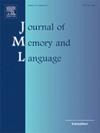研究重点和替代引物:语法角色和备选集广度的影响
IF 3
1区 心理学
Q1 LINGUISTICS
引用次数: 0
摘要
最近的研究表明,对比重音在话语加工中起着至关重要的作用,它使听者激活重点词的替代词和/或抑制非对比语义关联词。然而,关于词汇激活、句子和话语加工如何相互作用的关键理论问题依然存在。这些问题包括替代词集的广度,它可以从一个与语境相关的小词集到一个 "允许 "的大词集不等;以及这些过程最好被描述为激活机制还是抑制机制。此外,尽管主语与宾语的焦点相关属性存在差异,但关于替代词的激活是否因主语的语法角色而异的研究也很少。我们展示了两个跨模态词汇决策实验,结果表明非对比性联想的激活会随着对比性焦点的出现而受到抑制,这与抑制机制是一致的,至少对客体来说是如此。与主语语义相关或不相关的替代词都会被激活,这与广泛的、"允许的 "替代词集是一致的。主体与客体的引物模式存在显著差异。这项研究为我们从理论上理解焦点在话语加工中的作用做出了重要贡献。本文章由计算机程序翻译,如有差异,请以英文原文为准。
Examining focus and alternative priming: Effects of grammatical role and breadth of the alternative set
Recent work has shown that contrastive accenting plays a crucial role in discourse processing, causing listeners to activate alternatives to focused words and/or suppress non-contrastive semantic associates. However, key theoretical questions remain, relating to how lexical activation, sentence and discourse processing interact. These include the breadth of the alternative set, which could span from a small contextually-relevant set to a large, ‘permissive’ one; and whether these processes are best characterised as activation or suppression mechanisms. There is also little research on whether activation of alternatives differs by the grammatical role of the prime, despite differences in the focus-related properties of subjects versus objects. We present two cross-modal lexical decision experiments showing activation of non-contrastive associates is suppressed with contrastive focus, consistent with a suppression mechanism, at least for objects. Alternatives both semantically related, and unrelated, to the prime, were primed, consistent with a broad, ‘permissive’, alternative set. There were crucial differences in priming patterns for subjects versus objects. The study makes important contributions to our theoretical understanding of the role of focus in discourse processing.
求助全文
通过发布文献求助,成功后即可免费获取论文全文。
去求助
来源期刊
CiteScore
8.70
自引率
14.00%
发文量
49
审稿时长
12.7 weeks
期刊介绍:
Articles in the Journal of Memory and Language contribute to the formulation of scientific issues and theories in the areas of memory, language comprehension and production, and cognitive processes. Special emphasis is given to research articles that provide new theoretical insights based on a carefully laid empirical foundation. The journal generally favors articles that provide multiple experiments. In addition, significant theoretical papers without new experimental findings may be published.
The Journal of Memory and Language is a valuable tool for cognitive scientists, including psychologists, linguists, and others interested in memory and learning, language, reading, and speech.
Research Areas include:
• Topics that illuminate aspects of memory or language processing
• Linguistics
• Neuropsychology.

 求助内容:
求助内容: 应助结果提醒方式:
应助结果提醒方式:


